K Jeter - The Kingdom of Shadows
Здесь есть возможность читать онлайн «K Jeter - The Kingdom of Shadows» весь текст электронной книги совершенно бесплатно (целиком полную версию без сокращений). В некоторых случаях можно слушать аудио, скачать через торрент в формате fb2 и присутствует краткое содержание. Жанр: Триллер, на английском языке. Описание произведения, (предисловие) а так же отзывы посетителей доступны на портале библиотеки ЛибКат.
- Название:The Kingdom of Shadows
- Автор:
- Жанр:
- Год:неизвестен
- ISBN:нет данных
- Рейтинг книги:5 / 5. Голосов: 1
-
Избранное:Добавить в избранное
- Отзывы:
-
Ваша оценка:
- 100
- 1
- 2
- 3
- 4
- 5
The Kingdom of Shadows: краткое содержание, описание и аннотация
Предлагаем к чтению аннотацию, описание, краткое содержание или предисловие (зависит от того, что написал сам автор книги «The Kingdom of Shadows»). Если вы не нашли необходимую информацию о книге — напишите в комментариях, мы постараемся отыскать её.
The Kingdom of Shadows — читать онлайн бесплатно полную книгу (весь текст) целиком
Ниже представлен текст книги, разбитый по страницам. Система сохранения места последней прочитанной страницы, позволяет с удобством читать онлайн бесплатно книгу «The Kingdom of Shadows», без необходимости каждый раз заново искать на чём Вы остановились. Поставьте закладку, и сможете в любой момент перейти на страницу, на которой закончили чтение.
Интервал:
Закладка:
Sniffling, Pavli had looked up at his brother. “What? What was it?” There had been nothing then, no angel or ghost floating above them.
Matthi had shaken his head. “Don’t worry. Don’t even think about it. You’ll know everything, when it’s time.” A smile, or part of one. “And this will be our own secret, that nobody else will ever know. That you saw. And we won’t even talk about it to each other. Promise?”
He had nodded, sealing the promise deep onto his heart.
In the meantime, there was the beauty in the window of his uncle’s shop. That was another mystery, that bound him in its service.
His uncle had taken the photograph. Arthur Josefsohn had set up a portrait studio in the back of the shop, with black velvet drapes and a vase of silk flowers on a little table. The front window soon filled with samples of his craft. Men gazing unabashed into the lens, and girls turning just slightly away, in poses that were both demure and coquettish. And one of these was more beautiful than all the rest, her white-blonde hair caught luminous by the camera, one strand curling at her neck. Pavli’s uncle must have known as well that she was the loveliest one, for that photograph had been placed in the center of the shop window, in a silver frame set on an easel draped with velvet.
The first time Pavli saw the picture was when his uncle Turro brought him to the shop. Before that, he had never gone much out of the narrow streets and alleys of the Bayerisches Viertel, where the Lazarenes kept to themselves, Christian heretics among the Jews who largely comprised that district. The sight of the city’s broad thoroughfare, Unter den Linden, anchored at one end by the Imperial Palace and at the other by the smaller but equally impressive bulk of the Hotel Adlon, dazzled Pavli; it was like coming out of a dark cellar into the bright sunlight. His uncle had pointed with his cane to the Adlon’s towering stone facade. “There is more money in there than in the Reichsbank.” He’d smiled and winked at Pavli. “It’s safer there, too. So we can’t get at it.”
He’d stood on the sidewalk as his uncle had turned the key in the lock. That was when he had seen the photograph in the center of the window. “Pavli – come on.” His uncle had pushed the shop’s door open. “There’s much to do.” Then he’d seen what had caught and mesmerized his nephew. “She’ll be there when we leave,” he’d said, smiling and tugging Pavli inside.
Only later did he learn that the girl in the photograph was of the same blood as him, another child of the Lazarenes. But older than him, perhaps the same age as his brother Matthi. Which meant that she had learned secrets as well, or had begun to. Secrets from before even the Lazarenes, secrets that the mother of all men had whispered to the daughters of earth, when they had been no longer children and not yet women.
But those others did not concern him. All that Pavli cared about now was the girl in the photograph, in his uncle’s shop window.
Her father had left the faith. Pavli knew that much. The man would come into the shop and argue with Pavli’s uncle.
“There’ll be blood in the streets.” The man flicked cigar ashes onto the mahogany and brass display cases that Pavli had buffed with a soft rag just a few minutes before. “Plenty of blood. Oceans of it!” The man seemed to relish the prospect.
Pavli’s uncle remained unperturbed. “There’s been blood in the streets before. And often it’s been Lazarene blood.” He shrugged. “Yet the Lazarenes are still here. Just like die Juden. Here, or there, or somewhere.”
“The National Socialists are different.” It was obvious that the man would have joined the NSDAP if he could have. “They possess the intelligence, and the will. It isn’t just random outbursts of violence. Their policies are eugenics in action.”
Pavli’s uncle rolled his eyes. “Tell that to those thugs outside. The ones that go tromping up and down the street, scaring away the trade.” The boarded-up shop a few doors down still had its Jews Out painted across the front.
“They can’t accomplish what they need to, without breaking a few heads.” The man tilted his head back to breathe out a cloud of smoke. “That’s why it’s important to be on their side. Because there won’t be anybody left on the other side, when they’re done.”
Pavli’s uncle had muttered something in reply, but the man didn’t hear – he had pushed himself away from the counter and gone over to the shop’s front window. He came back with the silver-framed photograph.
“You see what I mean?” The girl in the photograph was his daughter Marte. “This is what I’m talking about. What you must do, Turro! To survive!”
Pavli’s uncle had told him the whole story after one of the man’s previous visits. How he had left the Lazarene faith and gone to live among the Gaje, how he’d tried to bleach with skin-burning acids the ritual tattoos on his wrists and along his ribs, to no avail. And how the man had married a Gaje woman, one that he didn’t love – a terrible sin, right there – but that had met certain specifications he’d had in mind.
“Look at her!” The man talked about his daughter in cold terms that made Pavli grit his teeth when he heard them. “She is the perfect image of German womanhood! Who could deny it?”
“Your precious National Socialists could.” Turro breathed on a lens and polished it with a soft white cloth. “They have legions of busybody little Rassenprufers, checking people’s pedigrees as if they were dogs.”
The other man’s voice bulled on. “A true Nordic beauty! Blonde and fair, the nose perfect, the brow just right.” He sounded as if he had taken the calipers of the Nazi racial investigators and measured every part of his daughter’s face. “And her eyes – eh? You saw?”
“Yes,” said Pavli’s uncle wearily. “I have seen your daughter’s eyes.”
“Blue! Both of them! None of this mongrel business, one blue, one brown! That alone should be the proof!”
Pavli’s life had been so enclosed in the little world of the Lazarene community, that only when his uncle Turro had brought him out into the city proper, had he seen that other people’s eyes were always both of the same color. The Gaje men and women and children had either blue eyes or brown, or sometimes grey or green – but not one blue and one brown. As were Pavli’s eyes, and those of his brother Matthi, and their uncle, and their parents sleeping in their graves, and all the other Lazarenes. It was the mark of their pure blood, a sign of their separateness that all were born with, that didn’t need to be tattooed on like the marks of Christ’s wounds. But until he had started working in his uncle’s shop, he had thought all people were that way. The first few days, he’d had to hold himself from peering sharply at everyone who came in, marveling at the simple fact of their eyes being matched in color.
The girl Marte’s eyes were both blue; Pavli had been able to tell this, even from just the black-and-white photograph. Her father gloated over that detail.
“ Two blue eyes!” It was why he had married the Gaje woman. “Like sapphires! Cornflowers!”
“You disgust me.” Pavli saw his uncle’s lip curl. “You’ve become just like them. You think you can breed people like cattle. Your own daughter -”
The argument had become even more heated, only breaking off when a customer had come into the shop.
“You will see, Herr Josefsohn.” The girl’s father bowed stiffly toward Pavli’s uncle behind the counter. “You will see that I am right about this.” He turned and strode out, trailing cigar smoke.
Pavli’s uncle let him put the silver-framed photograph back in the front window. Even just holding that object, the image of beauty, made the thoughts whirl clattering inside his head.
Читать дальшеИнтервал:
Закладка:
Похожие книги на «The Kingdom of Shadows»
Представляем Вашему вниманию похожие книги на «The Kingdom of Shadows» списком для выбора. Мы отобрали схожую по названию и смыслу литературу в надежде предоставить читателям больше вариантов отыскать новые, интересные, ещё непрочитанные произведения.
Обсуждение, отзывы о книге «The Kingdom of Shadows» и просто собственные мнения читателей. Оставьте ваши комментарии, напишите, что Вы думаете о произведении, его смысле или главных героях. Укажите что конкретно понравилось, а что нет, и почему Вы так считаете.












